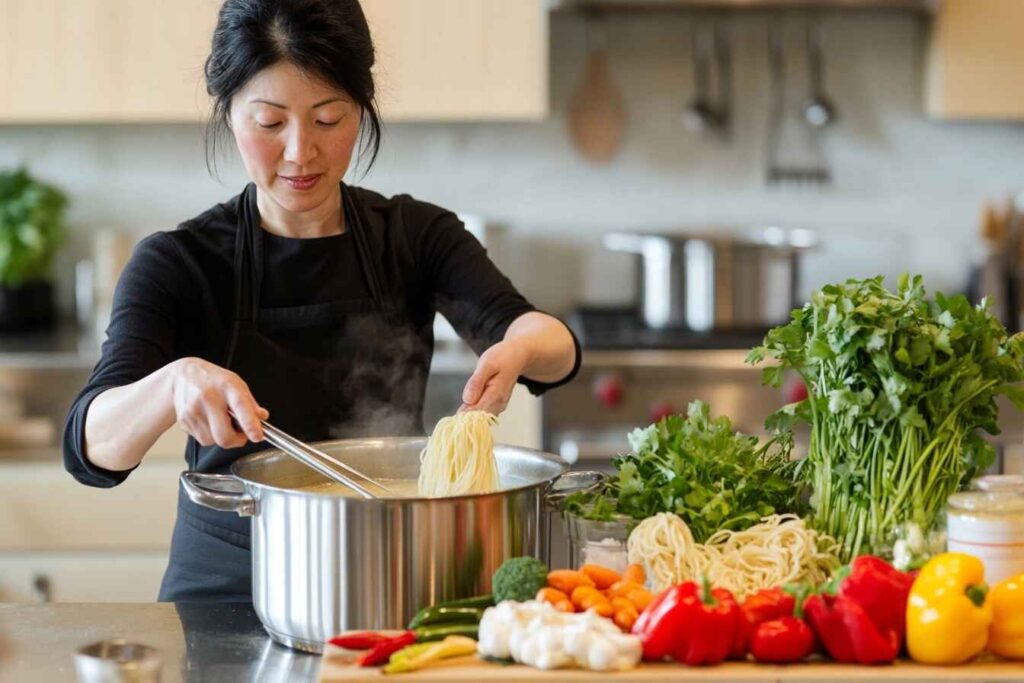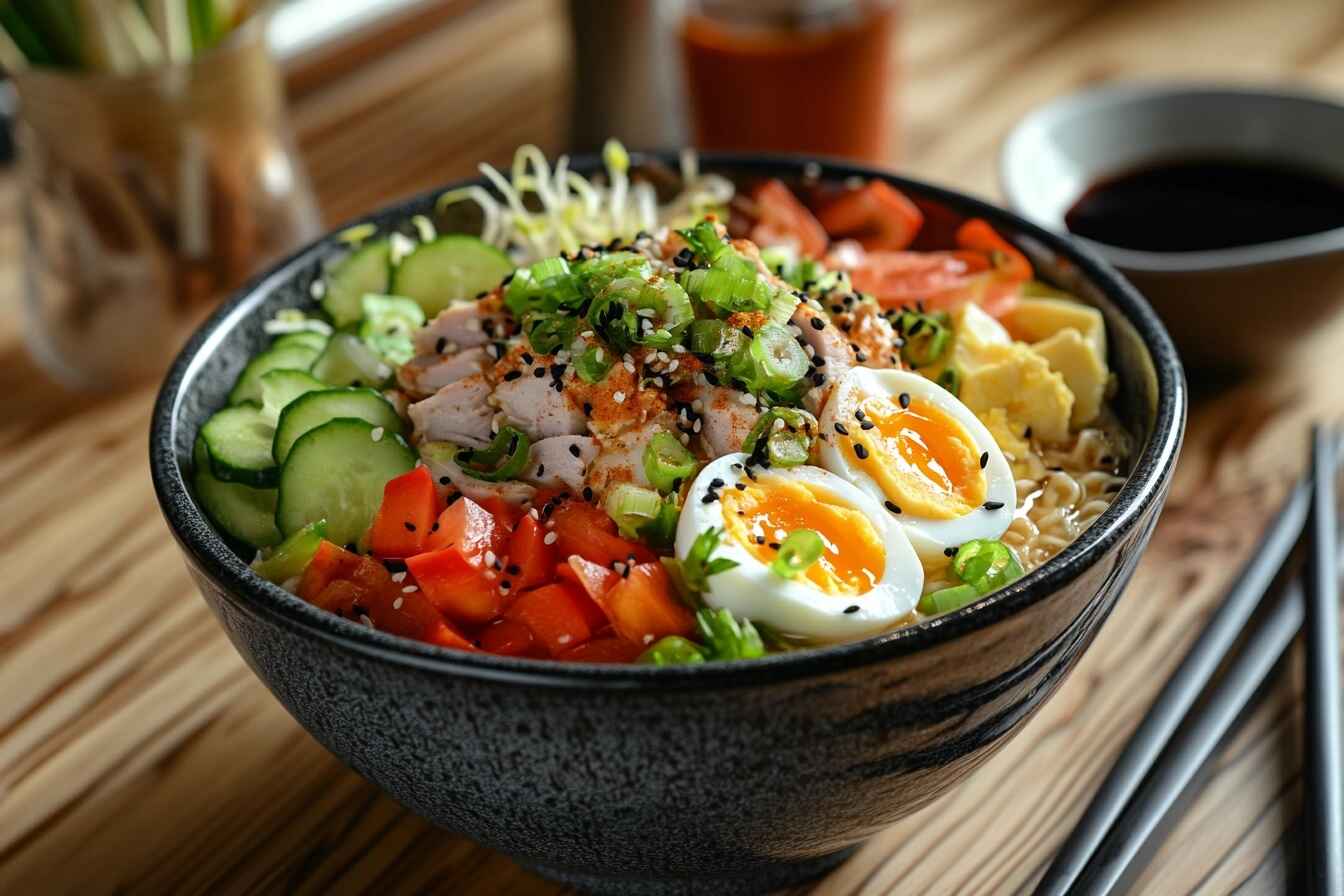If you’re a ramen lover and also mindful about eating halal, this question might have crossed your mind more than once: “Is ramen halal?” It’s a great question and one worth exploring because ramen, a Japanese noodle dish, is famous worldwide for its flavorful broths, unique toppings, and comforting vibes. But when it comes to halal requirements, things can get a bit tricky.
In this guide, we’ll dive into the world of ramen and uncover whether it can be enjoyed in line with Is This Noodle Dish guidelines. So, grab a warm cup of tea (or maybe some noodles?), and let’s get started!
Understanding Ramen: Origins and Evolution
What is Ramen? Ingredients and Popular Variations
Ramen is not just your ordinary noodle soup; it’s a cultural phenomenon. Originating from Japan, it combines wheat-based noodles with savory broths and various toppings like sliced pork, boiled eggs, seaweed, and vegetables. There are countless variations of ramen, each showcasing regional flavors and unique ingredients.
Here’s a quick table outlining the key components of a classic ramen bowl:
| Component | Common Ingredients |
|---|---|
| Noodles | Wheat noodles (alkaline-rich) |
| Broth Base | Pork bone, chicken, soy sauce |
| Protein | Sliced pork (chashu), boiled eggs |
| Toppings | Seaweed, green onions, corn |
But here’s the kicker: the most traditional versions of ramen often contain non-halal ingredients, which can be a problem for Muslim foodies. 🥺
Table of contents
A Brief History of Ramen: From Japan to the World
Ramen has humble beginnings. It’s believed to have originated from Chinese immigrants in Japan in the early 20th century. Over time, Japan put its unique spin on the dish, evolving it into a staple of Japanese cuisine.
Today, ramen has gone global, with ramen shops popping up in every corner of the world. But with its growth, there’s also been a need to cater to dietary preferences and restrictions, including halal.
The Concept of Halal: What Does It Mean?
Halal Food Guidelines in Islam
Halal is an Arabic word meaning “permissible” or “lawful.” In the context of food, it means the ingredients and preparation methods must comply with Islamic dietary laws. Here’s a quick rundown:
- No Pork or Pork Products: This includes gelatin and lard.
- No Alcohol: Any form of alcohol, even as a cooking ingredient, is not allowed.
- Meat Must Be Slaughtered Properly: It has to follow Islamic slaughter practices (dhabiha).
- Cross-Contamination is a No-No: Even small traces of non-halal substances can make food impermissible.
Knowing these basics is essential for understanding why not all ramen bowls can be considered halal.
“Halal food isn’t just about what you eat; it’s about how it aligns with your values and faith.” ✨
Common Misconceptions About Halal Certification
Many people think that halal food is limited or bland, but that’s far from the truth. Halal simply ensures that the food meets certain standards—it doesn’t change the taste or variety. When it comes to ramen, getting it Is This Noodle Dish is more about substituting ingredients without compromising flavor.
For instance:
- Swap pork broth for chicken or vegetable broth.
- Use halal-certified soy sauce instead of regular soy sauce.
- Replace toppings like chashu pork with halal chicken or beef.
Is Traditional Ramen Halal?
Ingredients in Traditional Ramen That May Not Be Halal
Here’s the bad news: most traditional ramen is not halal. Let’s break down why:
- Pork Broth: Many ramen recipes use tonkotsu (pork bone) broth for its rich flavor.
- Alcohol-Based Seasonings: Mirin and sake are often added to enhance the taste.
- Pork Toppings: Chashu, a braised pork belly slice, is a signature ingredient in many ramen dishes.
Even small amounts of these ingredients can make the dish non-halal, which is why identifying halal options requires extra attention.
Explore related recipes like Ramen Noodle Bowl: The Ultimate Guide to Perfecting Your Bowl for creative and adaptable ideas!
Alcohol in Ramen Broths: Is It Halal?
Here’s a tricky one. Some ramen broths contain alcohol-based seasonings like mirin or sake. Even if the alcohol “cooks off,” the essence remains, which can make the dish non-halal.
“When in doubt, it’s always better to opt for certified halal ramen options to ensure peace of mind.” 🍜
Challenges in Finding Halal Ramen
Lack of Halal-certified ramen Restaurants
One of the biggest struggles is that This Noodle Dish isn’t widely available in most places. While some restaurants are adapting to cater to halal customers, finding one that’s certified can still feel like searching for a needle in a haystack.
Hidden Ingredients That Are Not Halal
Even if a ramen dish looks halal, hidden ingredients like lard in the noodles or alcohol in the broth can make it unsuitable. Always ask questions and read labels carefully!
How to Identify Halal Ramen
So, you’ve got a craving for ramen, but how do you ensure what you’re eating aligns with halal requirements? Let’s break it down step by step.
Halal Certification Marks and Labels
The easiest way to confirm whether ramen is halal is by checking for certification. Look for logos or symbols from recognized halal certification bodies on packaged Is This Noodle Dish or menus.
Some common halal certification symbols include:
- The Halal Crescent logo.
- Certification from bodies like JAKIM (Malaysia) or HFA (UK).
If there’s no logo, don’t be shy—ask questions! Restaurants or brands might have halal options without explicit labeling.
“A little extra effort goes a long way in ensuring you’re eating halal and feeling good about it.” 🌟
Ingredients to Look Out For in Packaged Ramen
Pre-packaged ramen is a lifesaver for busy days, but it can also be a minefield of non-halal ingredients. Watch out for:
- Pork derivatives like lard or gelatin in flavor packets.
- Alcohol-based seasonings like mirin or sake.
- Unspecified meat flavors, which might include pork or non-halal chicken.
Here’s a handy checklist:
| Ingredient | Halal or Not? |
|---|---|
| Vegetable Broth | ✅ Usually Halal |
| Chicken Flavoring | ❌ Not Always Halal |
| Soy Sauce | ✅ Halal-certified versions |
| Gelatin | ❌ Often Pork-Based |
When in doubt, opt for simple vegetable or miso-based ramen without seasoning packets, and add your own toppings to control what goes into your bowl.
Making Ramen Halal at Home

Making your own ramen at home is not only satisfying but also a guaranteed way to ensure it’s 100% halal. Plus, you get to customize the flavors to your liking. Ready to play chef? Let’s go!
Substituting Non-Halal Ingredients with Halal Alternatives
Here are some swaps to make Is This Noodle Dish without losing its signature taste:
- Broth Base: Use chicken, beef, or vegetable broth instead of pork bone broth.
- Seasonings: Replace mirin with apple cider vinegar and a touch of sugar.
- Protein: Swap pork chashu for halal chicken slices, beef, or even grilled tofu.
- Toppings: Skip fish cakes with alcohol-based preservatives and stick to fresh vegetables, boiled eggs, or seaweed.
Recipes for Homemade Halal Ramen
Let’s whip up a simple halal ramen recipe! 🍜
Ingredients for Halal Chicken Ramen (Serves 2):
| Ingredient | Quantity |
|---|---|
| Chicken broth | 4 cups |
| Halal chicken breast | 200g, thinly sliced |
| Soy sauce (halal) | 2 tbsp |
| Garlic (minced) | 3 cloves |
| Ginger (grated) | 1 tsp |
| Ramen noodles (egg-free) | 2 packs |
| Soft-boiled eggs | 2 |
| Green onions (sliced) | 2 tbsp |
| Sesame oil | 1 tbsp |
| Nori (seaweed sheets) | 2 small sheets |
Step-by-Step Instructions:
- Prepare the Broth: In a pot, heat sesame oil and sauté garlic and ginger until fragrant. Add chicken broth and soy sauce. Let it simmer for 10-15 minutes.
- Cook the Chicken: In a pan, cook the chicken slices until tender. Season with a pinch of salt and pepper.
- Boil the Noodles: Cook ramen noodles according to the package instructions, then drain and set aside.
- Assemble the Bowl: Divide the noodles into two bowls. Pour the broth over the noodles and top with chicken, boiled eggs, green onions, and nori.
- Serve and Enjoy: Grab your chopsticks and dig in! 😋
“Cooking your own ramen gives you full control over the flavors and ingredients. Plus, it’s a fun activity for a cozy evening at home.” 🏠
Popular Halal Ramen Brands and Restaurants
If cooking isn’t your thing, don’t worry. Halal-certified ramen brands and restaurants have got your back!

Halal Ramen Brands You Can Find Online
Some brands cater specifically to halal diets, making it easy to enjoy ramen from the comfort of your home. Check out these options:
- Samyang Halal Ramen: Famous for its spicy Korean Is This Noodle Dish, this brand offers halal-certified options that pack a punch. 🌶️
- Nissin Halal Ramen: A go-to for Japanese ramen lovers, Nissin’s halal-certified line features soy and chicken flavors.
- Indomie: While it’s primarily an Indonesian noodle brand, its halal-certified instant noodles are a versatile Is This Noodle Dish base.
For more homemade inspiration, check out Ramen Noodle Bowl: The Ultimate Guide to Perfecting Your Bowl.
Halal-certified ramen Restaurants Around the World
Here are some must-visit spots for Is This Noodle Dish enthusiasts:
- Ayam-YA (Japan): This Noodle Dish chain in Japan offers authentic chicken-based ramen.
- Ichikokudo Hokkaido Ramen (Singapore): Famous for its halal-certified Hokkaido-style Is This Noodle Dish.
- Halal Ramen NARITAYA (Kyoto): A gem in Kyoto that serves halal-certified ramen with rich miso flavors.
Planning a trip? Bookmark these places and let your ramen adventures begin. ✈️🍜
Addressing Common Questions About Halal Ramen
Even with all this information, you might still have some lingering questions about how ramen fits into halal dietary practices. Let’s address a few commonly asked queries.
Can Ramen Be Made Halal Without Certification?
Yes, ramen can be halal even if it isn’t certified, provided the ingredients meet halal requirements. For instance, if a dish is made with vegetable broth, halal-certified meats, and alcohol-free seasonings, it aligns with Islamic dietary laws. However, for packaged ramen or dining out, certification ensures you can enjoy the dish without any uncertainty.
“Certification is like having a stamp of assurance—it simplifies the process of making informed choices about your meals.”
Are Vegan Ramen Options Always Halal?
Not necessarily. While vegan ramen excludes animal products, it might still contain alcohol-based seasonings like mirin or be prepared in a kitchen where cross-contamination occurs. Always check the ingredient list or ask the chef when dining out.
Benefits of Choosing Halal Ramen
Enjoying Is This Noodle Dish prepared in a halal-friendly way goes beyond just following dietary rules. Let’s look at the broader benefits.
Aligning Food Choices with Faith
Ramen that adheres to halal guidelines lets you savor the flavors guilt-free, knowing your meal aligns with your values. This connection between food and faith enriches the dining experience, turning every bowl into a moment of mindfulness.
“Food isn’t just fuel—it’s a reflection of the values we hold close.”
Ensuring Ethical and Clean Eating
Halal-certified foods are produced following strict hygiene and ethical standards, ensuring the meal you enjoy is both clean and responsibly prepared. Ingredients are sourced and handled with care, providing you with peace of mind.
Conclusion: Embracing Ramen That Fits Your Lifestyle
This Noodle Dish is an incredibly versatile dish that can be adapted to suit any dietary preference, including halal. Whether you choose to prepare it yourself, purchase halal-certified instant noodles, or explore restaurants catering to halal diets, the key is understanding your options and making informed choices.
“With creativity and awareness, enjoying a bowl of ramen while adhering to halal practices is simpler than you think.”
Ramen Recap: A Quick Summary Table 📋
| Aspect | Key Takeaway |
|---|---|
| Traditional Ramen | Contains non-halal ingredients like pork and alcohol. |
| Identifying Halal Ramen | Look for certification or verify ingredients. |
| Homemade Halal Ramen | Substitute non-halal items with halal-friendly options. |
| Popular Halal Brands | Samyang, Nissin Halal, and Indomie. |
| Restaurants to Try | Ayam-YA (Japan), Ichikokudo (Singapore), and Naritaya. |
A Final Bowl of Inspiration 🍲
Remember, exploring Is This Noodle Dish is more than just satisfying your hunger—it’s about celebrating your love for food while honoring your values. Whether you’re slurping up a spicy chicken broth or savoring a homemade vegetarian version, each bowl is a delicious reminder of how adaptable and inclusive food can be.
So, next time you’re craving ramen, you know exactly what to do. Bon appétit—or as they say in Japan, itadakimasu! 🙏

